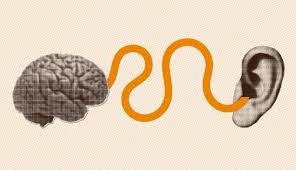By James Attah Ansah
There’s a curious moment in every Ghanaian family gathering when an elder leans in, eyebrows arched and yells, “Turn that thing down!”—referring, of course, to either the TV, the music or someone’s overzealous voice. The irony? The said elder often has the volume on their own ears turned down—permanently. And that, dear reader, is our entry point into the sound (or silence?) of hearing impairment.
Let’s start with a confession: hearing is a privilege many of us treat like leftover akple—ignored until it’s gone. But hearing is no small matter. It’s the symphony of our lives—the honk of a trotro, the cry of a new-born, the sweet chaos of market women debating tomato prices, and, if you’re lucky, your name being whispered lovingly (or sternly) by your mother.
So, What Exactly Is Hearing Impairment?
Scientifically speaking, hearing impairment is the partial or total inability to hear in one or both ears. It ranges from mild difficulties (like mishearing “send me airtime” as “send me her time”) to profound deafness, where sound becomes a rumour, a shadow, a distant thunder no longer reaching the ears.
More specifically, hearing loss may be mild, moderate, moderately severe, severe or profound. It can affect one ear or both ears and leads to difficulty in hearing conversational speech or loud sounds. Hard of hearing refers to people with hearing loss ranging from mild to severe.
The World Health Organisation estimates that over 1.5 billion people globally live with some form of hearing loss. That’s roughly the population of all the people who swear they can’t hear their alarms in the morning. In Ghana, it’s a rising concern, with increasing cases linked to genetics, ageing, loud environments, untreated infections and—you guessed it—blasting music directly into your soul via headphones.
Types of Hearing Impairment
Conductive hearing loss: Conductive hearing loss results from defects in the outer or middle ear. The sound is not conducted efficiently to the inner ear. All sounds heard thus become weak and/or muted. Usually such individuals speak softly irrespective of the surrounding environmental noise.
Conditions that cause conductive hearing loss are:
Wax in the ear canal.
Diseases of the outer and middle ear associated with symptoms like earache and ear discharge.
Congenital defects in the outer or middle ear – defect and damage to the outer or middle ear.
Upper respiratory tract infections.
Neglect of care of ears and oral cavity (mouth).
Sensorineural hearing loss: Sensorineural hearing loss is caused by damage or disease of the inner ear or auditory nerve. It could also result as an after effect of infectious diseases like measles, mumps, meningitis and T.B.
Some conditions that may cause congenital sensorineural hearing loss are:
Hereditary childhood deafness
Rh incompatibility
Premature birth – birth before due time
Birth Asphyxia (lack of oxygen supply to the new-born due to inability to breathe normally resulting in blueness of baby due to various reasons).
Viral infections in pregnancy
Exposure to X–rays in the first trimester of pregnancy – taking X–ray within the first three months
Harmful drugs of mycin variety e.g. streptomycin
Acoustic neuroma (Tumour of the auditory nerve)
Mixed hearing loss: Mixed hearing loss is the combination of conductive and sensorineural hearing loss. One of the main causes of this type of loss is the long-standing ear infection called Chronic Suppurative Otitis Media (CSOM). In CSOM, ear discharge in the form of pus, blood or clear water is seen. This starts with conductive loss yielding to sensorineural impairment, if not treated immediately and regularly.
Central hearing loss: Central hearing loss is due to a damage, malformation or infections of the neural pathways and the hearing centres in the brain. The child may hear but has difficulty in understanding what he hears. Some of the children classified as learning disabled or slow learners may have this type of hearing loss.
Functional hearing loss: Functional hearing loss is attributable to some psychogenic condition or maybe due to deliberate exaggeration of hearing thresholds for personal gains.
“Say What?” – The Social Struggles
People with hearing impairment often navigate a world designed for listeners. Imagine living in a society where every important announcement is made via microphone but without captions. It’s like being invited to a jollof party but being told you can’t eat rice.
Communication becomes a dance of embellished lips, gesturing hands and the ever-persistent “can you say that again?” Friends might mistake your quietness for rudeness, teachers might think you’re distracted, and your crush might think you’re ignoring them when, in fact, you just didn’t hear the compliment.
Worse still, in many communities, hearing impairment is still surrounded by stigma, mystified as a curse, a punishment, or just plain bad luck. As a result, children are kept home from school, adults are denied jobs, and many suffer in silence—literally and figuratively.
The Science of Sound and Solutions
But fret not! Thanks to science, society doesn’t have to stay tone-deaf to the needs of the hearing impaired. Hearing aids, cochlear implants and sign language interpretation services are transforming lives.
Hearing aids today are not the clunky, whistling boxes of the past. They’re sleek, smart, and sometimes more technologically advanced than your smartphone. Cochlear implants—tiny bionic miracles—can bypass damaged parts of the ear and directly stimulate the auditory nerve. Imagine your inner ear with Wi-Fi!
Equally powerful is the growing recognition of sign language. It’s not just a tool; it’s a language of the eyes, the hands and the heart. Ghanaian Sign Language (GSL) is vibrant, expressive and deserves a spot in our classrooms and TV broadcasts.
We All Need to Listen Better
You don’t need hearing loss to care about hearing. Start by protecting your ears—turn the volume down, wear ear protection in noisy environments and seek medical attention for ear infections faster than you say, “otitis media.”
More importantly, let’s build a world where people with hearing impairment are not sidelined but centred. Make public spaces inclusive, learn a bit of sign language and above all—listen. Because listening goes beyond ears; it’s about empathy.
So, next time you find yourself shouting “Can you hear me now?”, consider this: maybe the real question isn’t whether someone can hear, but whether we, as a society, are truly listening.
Now hear this: hearing impairment is not a tragedy. Ignorance is.
By James Attah Ansah
Website: https://jaansahpublications.com



